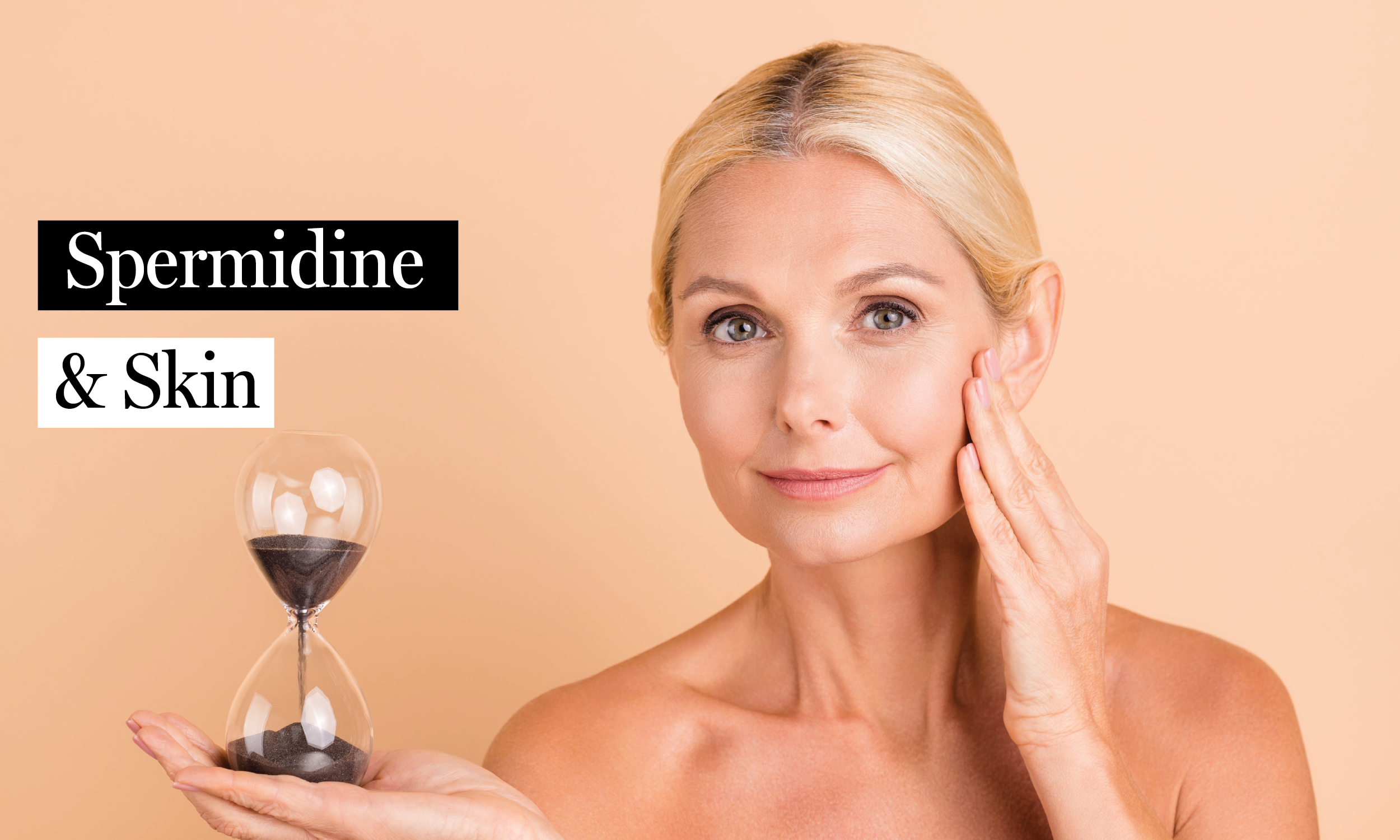
Is there any area where natural spermidine supplementation doesn’t deliver a benefit? We haven’t found one yet! Spermidine—a naturally occurring polyamine present in all living organisms and abundant in foods like aged cheese, mushrooms, legumes, and whole grains—has been gaining attention for its benefits on skin health.
Skin health goes beyond aesthetics: it plays a critical role as the body’s largest organ and primary barrier against environmental stressors. Supporting it at the cellular level through autophagy offers a meaningful path to promoting overall well-being.
Recent studies, including human trials, have demonstrated spermidine’s ability to improve skin structure, strengthen the barrier function, and enhance overall appearance. Whether applied topically or taken as a supplement, spermidine is proving to be a powerful ally in skincare and dermatology. In this blog, we dive into the science behind its skin-supporting effects—because with spermidine, healthy skin is more than just surface-level.
 The benefits of spermidine in the skin. Recap of the findings from the studies mentioned in this article. © 2025 Melissa Cano. All rights reserved.
The benefits of spermidine in the skin. Recap of the findings from the studies mentioned in this article. © 2025 Melissa Cano. All rights reserved.
Spermidine protects the skin barrier function & has anti-aging effects
Spermidine offers dual benefits in both strengthening the skin barrier (the stratum corneum, the outermost layer of your skin) and combating signs of aging. A pivotal human study by Kim et al. (2021) demonstrated that spermidine secreted by beneficial Streptococcus species in the skin microbiome significantly improves skin structure, elasticity, hydration, and texture:
- Elasticity: Increased by 12.1% after 28 days of applying spermidine-rich Streptococcus secretions to the cheeks of healthy female participants.
- Hydration: Improved by 26.7%, alongside an 11.3% reduction in trans-epidermal water loss, reflecting stronger barrier integrity.
- Desquamation (the shedding of the skin barrier): Reduced by 18.4%, indicating healthier skin turnover and smoother texture.
These improvements can be attributed to spermidine’s ability to:
- Induce autophagy: Spermidine activates autophagy by inhibiting acetyltransferase EP300. This cellular process recycles damaged organelles and proteins, playing a crucial role in skin homeostasis, clearing senescent cells, and regulating pigmentation. As a result, it enhances skin barrier function, reduces oxidative stress, and promotes healthy skin cell turnover.
- Stimulate collagen and elastin synthesis: Spermidine supports the production of collagen by upregulating the expression of collagen proteins COL1A1 and COL3A1, essential for maintaining skin firmness and reducing the appearance of wrinkles. It also stimulates the expression of other genes involved in skin elasticity, including ELN (elastin) and FBN1 (fibrillin-1), which are critical components of elastic fibers in the extracellular matrix.
- Enhance lipid synthesis and barrier function: Spermidine upregulates genes involved in lipid production, which fortifies the skin’s natural protective barrier and supports overall skin health.
Together, these mechanisms highlight spermidine’s unique potential as a natural, science-backed ingredient for anti-aging skincare and barrier repair.
Spermidine promotes wound healing
Wound healing is a complex process involving inflammation, cell proliferation, and tissue remodeling. In an animal model study by Ito et al. (2021), spermidine was shown to significantly accelerate skin wound healing in mice. Both systemic and topical administration of spermidine enhanced the wound closure rate, with systemic treatment achieving 50% wound closure in just 2.8 days compared to 5.3 days in untreated mice. The mechanism involved:
- Activation of the uPA/uPAR signaling pathway: The urokinase-type plasminogen activator/receptor pathway promotes cell migration and extracellular matrix remodeling. It plays a key role in wound healing and skin regeneration.
- Stimulation of keratinocyte proliferation and migration: Spermidine supports tissue repair by stimulating keratinocyte proliferation and migration. This was demonstrated through increased PCNA expression (a marker of cell proliferation) and accelerated scratch wound closure in vitro, indicating its role in promoting cell growth and movement during the healing process.
- Induction of inflammatory cytokines: Topical spermidine increased cytokines IL-6 and TNF-α levels, which are critical for initiating the wound healing process.
These findings open the door to using spermidine as a gentle yet powerful ally in supporting the body’s natural healing process.
Spermidine supports melanin production
A study conducted by Kang and Kim (2021) investigated the role of spermidine in melanin synthesis using B16F1 cells, a mouse melanoma cell line. The results suggest that spermidine may help maintain healthy skin pigmentation by:
- Stimulating melanin production: Spermidine activates the MITF signaling pathway, which upregulates key melanogenesis enzymes including tyrosinase, TRP-1, and TRP-2, which are essential for melanin synthesis.
- Reducing oxidative stress: By decreasing intracellular hydrogen peroxide (H₂O₂) levels, spermidine protects melanocytes from oxidative damage and promotes melanin production even under stress, potentially supporting natural pigmentation and preventing hair greying.
Spermidine promotes healthy melanin synthesis, supporting an even skin tone, natural radiance, and built-in photoprotection, which are key elements of vibrant, resilient skin. These promising in vitro findings also highlight spermidine’s potential as a therapeutic agent for pigmentation disorders such as vitiligo and age-related hair greying. (Curious about its impact on hair? Don’t miss our blog on hair growth and greying!)
Human pilot study demonstrates spermidine's potential for skin health
The positive effects of spermidine on skin health observed in both preclinical and human studies highlight its potential for incorporation into skincare products and therapeutic applications. From anti-aging formulations to wound-healing treatments, spermidine-based innovations may help redefine the future landscape of dermatology.
In a pilot study led by the Medical University of Graz in collaboration with Longevity Labs, researchers explored the effects of topical spermidine on facial skin health. This double-blind, placebo-controlled trial involved 60 female participants who applied either a spermidine-infused cream or serum—containing 0.0195 mg/g or 0.065 mg/g of spermidine from wheat germ extract, the same extract found in our spermidineLIFE® products—or a placebo to their faces once daily for three months.
The results were promising: participants using the spermidine products experienced improvements in skin hydration, elasticity, and micro-relief. Additionally, they saw a noticeable reduction in skin roughness and wrinkle depth reduction in skin roughness and wrinkle depth. These encouraging findings provide strong evidence for spermidine as a powerful ingredient in skin rejuvenation, delivering both visible and measurable enhancements to overall skin appearance.
How to get the benefits of spermidine for your skin?
Here are a few simple ways to make spermidine part of your daily wellness ritual:
- Eat for your skin: “Let food be thy medicine and medicine be thy food.” Healthy skin starts with nourishing foods. Load up on spermidine-rich staples like aged cheese, mushrooms, legumes, and whole grains to support your skin from the inside out.
- Go topical: Both our research and external studies highlight the benefits of applying spermidine directly to the skin. For skincare products already harnessing its power, we love Young Goose, who features our very own spermidineLIFE® in their cutting-edge topical formulas.
- Supplement smartly: For a consistent daily dose, spermidineLIFE® natural supplements are a great way to support cellular renewal through autophagy, while also tapping into spermidine’s antioxidant and anti-inflammatory benefits.
Glow deep with spermidine
Spermidine is a natural ally for achieving radiant, healthy skin. Its ability to improve skin elasticity, hydration, barrier function, and wound healing makes it a versatile ingredient in modern skincare. With human studies confirming its efficacy, spermidine holds immense potential for transforming the way we care for our skin.
Whether you're looking to combat aging, enhance hydration, or accelerate repair, spermidine offers a science-backed solution rooted in cellular health. Add this remarkable molecule to your skincare ritual—and let your glow cell-ebrate from the inside out! ✨







